The big headline next Tuesday night will undoubtedly be whether Donald Trump or Hillary Clinton has emerged victorious in the U.S. presidential election.

The no-holds-barred race for the White House has dominated headlines for over a year, but in reality, it’s only one part of a much bigger electoral picture.
Americans are getting ready to make decisions on a slew of down-ballot races and policy measures that have largely escaped attention in the lead-up to Nov. 8.
As election day approaches, here’s a look at five things you probably didn’t realize are being put to the populace.
Local representatives
Americans may not vote directly for their president (that’s done through the Electoral College) but they do choose their local and state representatives.
In this election, 34 Senate seats are up for grabs — enough to potentially hand that part of Congress back to the Democrats and make a future president Hillary Clinton’s life a bit easier.
READ MORE: How the U.S. Congress can derail a presidency, no matter who wins
In addition, America will vote for all 435 seats in the U.S. House of Representatives (which is expected to remain majority Republican) and select the governors of 12 states.
In the end, these are are the folks who determine whether the president can get anything done. They also have an enormous amount of influence over things like taxes, marriage laws, infrastructure, local construction projects, prescription drug pricing and minimum wage.
WATCH: How exactly do Americans elect their president?

The field of candidates for governor, senator or House representative is also interesting this year.
America could elect its first openly bisexual governor in Oregon (Kate Brown), lose the only two black Republicans currently sitting in the House, and send its first Latin-American woman (Nevada’s Catherine Cortez Masto) to the Senate.
Voters in Illinois may also elect their first half-Thai senator, Tammy Duckworth, who lost parts of both her legs serving in Iraq.
Porn industry safety
Should adult film actors be required to wear condoms while filming scenes depicting penetrative sex? That’s the question being put to voters in California next week.
Proposition 60 will require producers of pornographic films to provide condoms and ensure that performers use them during performances in which “performers actually engage in vaginal or anal penetration by a penis.”
WATCH: Utah declares pornography a public health crisis, calls it an ‘epidemic’

The condoms wouldn’t need to be visible in the final edits of films, but producers would need to prove that they were used. Proposition 60 would also force them to cover the cost of STI tests, vaccines and medical examinations for the actors.
Interestingly, the new rules would also apply to reality television programs where contestants have sex off-screen, such as Big Brother and The Bachelor. These shows would also need to prove condoms were used.
Guns
Gun laws have always been highly contentious in the United States, with lobby groups and the Republican Party pushing back against any attempt to tighten the rules around gun ownership.
But a number of jurisdictions may see changes next week that would make accessing firearms (slightly) more difficult.
WATCH: Americans under 30 more open to gun control: poll

Maine and Nevada could soon require a point-of-sale background check for all classes of firearms, if voters support ballot measures to that effect.
Californians will decide whether to join states like New York, Connecticut and Washington, D.C., in requiring background checks when buying ammunition.
Meanwhile, in Washington state, a proposed ballot measure would allow police, family, or household members to obtain court orders temporarily preventing firearms access by “persons exhibiting mental illness, violent or other behavior indicating they may harm themselves or others.”
Weed
That’s right, Canada isn’t the only place where marijuana is edging toward legalization. In some states, including Arkansas, Montana, Florida and North Dakota, the ballot questions in this election are focused on legalizing medical marijuana.
Medical pot is already legal in 25 states and in Washington, D.C.
- Alberta to overhaul municipal rules to include sweeping new powers, municipal political parties
- Canada, U.S., U.K. lay additional sanctions on Iran over attack on Israel
- Trudeau says ‘good luck’ to Saskatchewan premier in carbon price spat
- No more ‘bonjour-hi’? Montreal mayor calls for French only greetings
READ MORE: Why home marijuana cultivation will be a headache for Canadian regulators
After next week, recreational marijuana could be heading for legalization in five additional states — bringing the total number of U.S. states that have legalized the drug to nine.
States voting on recreational marijuana-related ballot initiatives include Nevada, Arizona, California, Maine and Massachusetts.
Slavery
Yup. You read that correctly.
A full 151 years after the abolition of slavery in the United States of America, the good people of Colorado are being asked if lawmakers should close a final loophole in the state’s constitution that still allows for slavery or involuntary servitude “when used as punishment for persons duly convicted of a crime.”
BONUS: Colorado’s voters will also be deciding whether or not to allow medical assistance in dying for adults diagnosed with terminal illnesses and facing imminent death.
The procedure would be governed by similar restrictions to the ones introduced in Canada’s assisted dying legislation earlier this year.




Comments